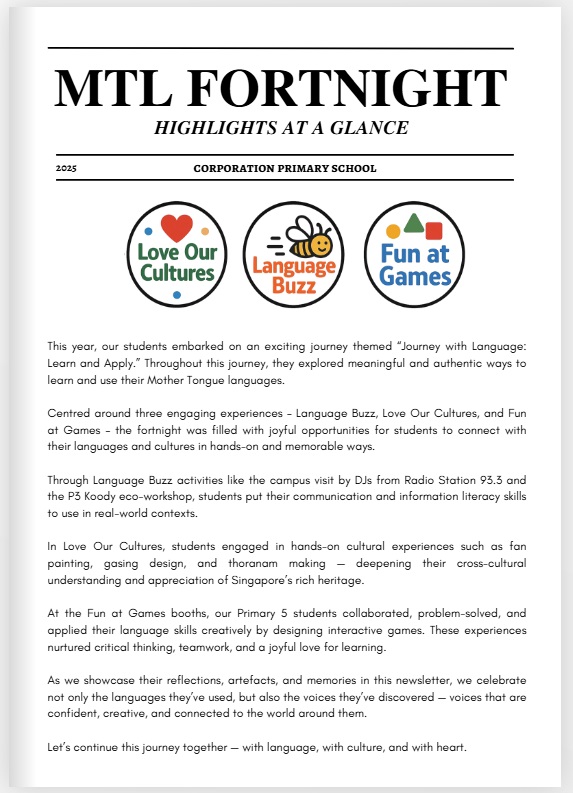Mother Tongue
Mother Tongue
Check out our latest newsletter!
Mother Tongue Language Department

Vision
Nurture lifelong learners who are confident users of MTL & are culturally savvy.
Mission
To provide a conducive environment for students to learn and use the language actively, confidently and joyfully.
Aim of MTL Curriculum
“Joyful Learning, Confident Users”
Aim to help students to experience the joy of learning and become confident users with a strong foundation in language competencies, appreciate their culture and traditions, as well as 21st century competencies.
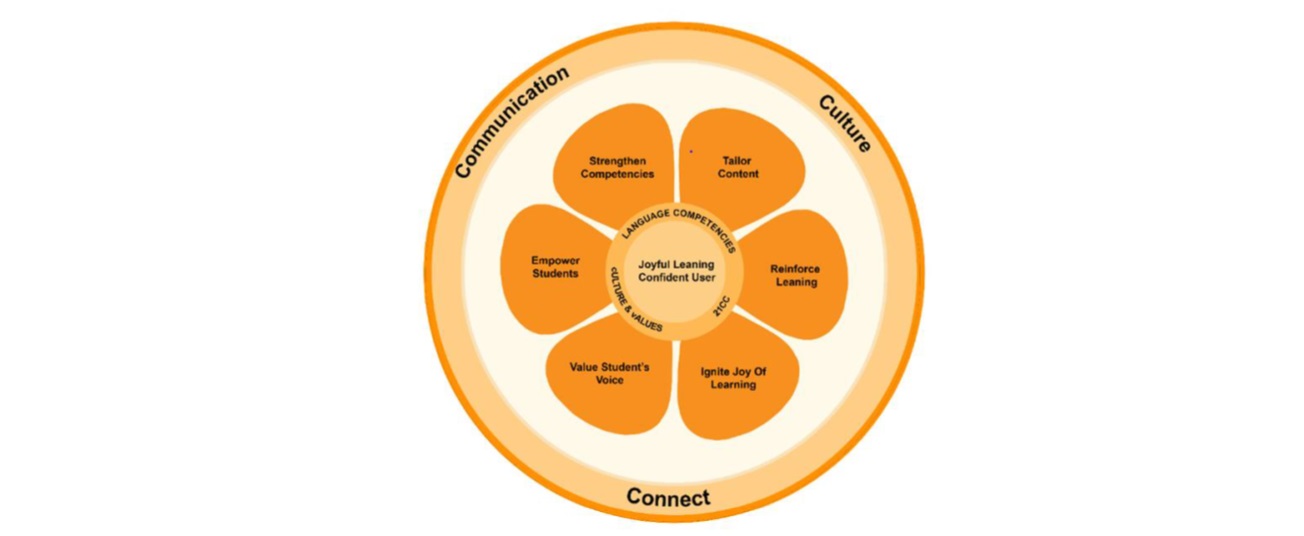
Learning Outcomes
-
Use interaction skills to communicate information, express views and opinions.
-
Love, appreciate and pass on traditional ethnic culture
-
Understand Singapore local culture to develop a sense of belonging to the country
-
Demonstrate kindness and sensitivity towards people from different social, cultural and religious backgrounds within Singapore.
MT Programmes
1. P1 & P2 SOAR Programme
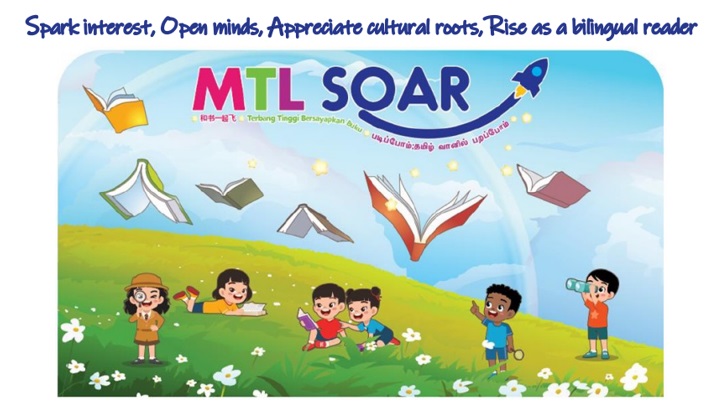
Reading brings forth a wide range of social and emotional benefits. The benefits are also associated with stronger intrinsic motivation, better academic outcomes and global competence. Additionally, cultivating positive reading habits will help our students build a strong MTL foundation and develop language proficiency.
MTL SOAR aims to instil students’ love for reading in MTL, to Spark interest, Open minds, Appreciate cultural roots, and Rise as a bilingual reader.
Starting from 2025, P1 and P2 students will have 30 minutes of their MTL curriculum time ringfenced for reading and library-related activities. As part of MTL SOAR, teachers would be using the small/supplementary readers that are developed as part of the new Primary MTL Curriculum.
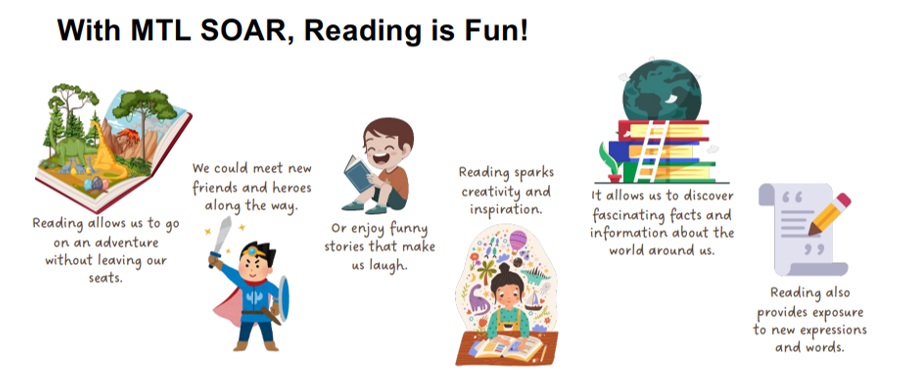
Useful Parent Guides
• Parents’ Guide for SOAR Programme(CL)
Parents' Guide for MTL Reading (CL) P1
Parents' Guide for MTL Reading (CL) P2A
• Parents’ Guide for SOAR Programme(ML)
Parents’ Guide for MTL Reading(ML) P1 & P2
• Parents’ Guide for SOAR Programme(TL)
Parents' Guide for MTL Reading (TL) P1 & P2
2. MTL Reading Programme
Our in-house reading programme aims to cultivate a love for reading and nurture lifelong readers through engaging activities. Students participate in both reading and post-reading activities to deepen their appreciation of books, with dedicated curriculum time set aside for library visits, where teachers guide them in selecting suitable books.
To celebrate World Book Day, the department organises enriching activities such as mini book creation and book discussions to encourage students to immerse themselves in stories, share their perspectives, and discover new literary adventures.
For younger learners, the e-reading portal (Dudutown) enhances engagement by providing interactive reading experiences. Additionally, book fairs will be arranged, giving students the opportunity to explore and select books that captivate their interest. Through these initiatives, we aspire to cultivate a vibrant reading culture and instill a lifelong passion for reading in our students!

3. Festival Celebrations
To nurture our students to be culturally savvy, the department will celebrate various festivals such as Chinese New Year, Hari Raya Puasa, and Deepavali annually. Celebrations for Mid-Autumn Festival and Pongal Festival are sometimes included as well. Through these celebrations, students will gain a deeper understanding of these festivals and develop an appreciation for other cultures, fostering racial harmony and integration.
4. MTL Fortnight Learning Fest
To create a conducive environment for promoting MTL usage and learning beyond the classroom, our school organises the Mother Tongue Language Fortnight Learning Fest annually.
Through a variety of creative language competitions and enrichment sessions, we hope to make language learning more immersive, enjoyable, and relevant. We also aim to deepen students’ appreciation of their Mother Tongue Language and inspire them to use it more confidently in their daily lives.
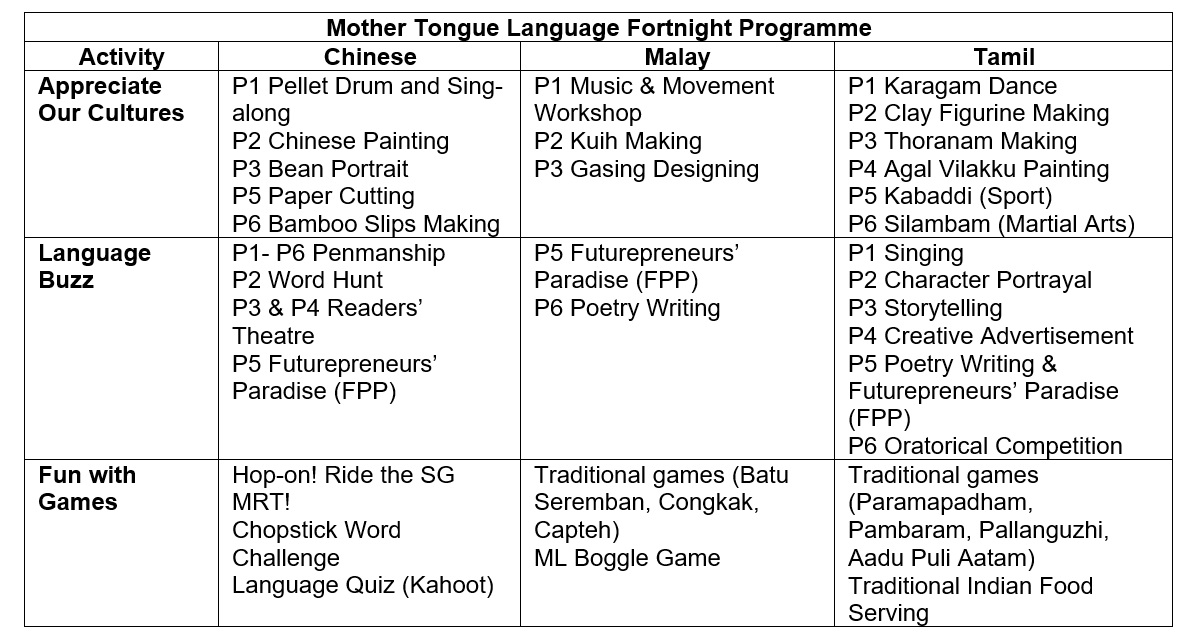
5.Cultural Appreciation Programme
During the annual MTL Fortnight, students will have the opportunity to experience different cultural workshops throughout their six years of education. These workshops aim to extend and enrich students' learning through cultural immersion.
6. Primary 4 Language Cultural Camp (LCC)
Every year, our P4 students participate in the annual Language Cultural Camp, where they engage in a variety of interactive language and cultural activities. This immersive experience allows them to learn through play, deepen their appreciation of the language, and build confidence in using it.
7. LEAP Programme (Language Exploration and Appreciation Programme)
The LEAP Programme is designed to enrich the learning experiences of higher-progress students by providing them with engaging and challenging opportunities. A series of stretch programmes are curated to enhance their skills, including the P4 & P5 Young Journalist Programme and the P5 Literature Programme (CL).
In the Young Journalist Programme, students explore the world of journalism by sourcing interesting news, gathering relevant information, and reporting their findings. Once equipped with essential journalistic skills, they will take on the role of student reporters, covering school events.
LEAP aims to:
-
Nurture students into creative writers.
-
Develop critical thinkers and confident communicators.
-
Expose students to different text genres and cultivate their interest in literature.
This programme empowers students to deepen their language appreciation, enhance their communication skills while developing their 21st century competencies.
8. Support Programme
MTSP for Primary 3 – Primary 4 (Mother Tongue Support Programme)
The Mother Tongue Support Programme (MTSP) is designed to provide targeted support for students in a smaller class setting, with a recommended class size of 8-12 students or 9% of the cohort per MTL, whichever is lesser. MTSP lessons are conducted during curriculum time and focus on a structured approach to developing oracy and literacy skills. The teaching is explicit, skills-focused, systematic, and progressive, moving from simple to complex concepts. To enhance learning, customised multi-sensory materials are used to make lessons fun and engaging. Students learn in an immersive language environment, enabling them to gain confidence and joy in using MTL. The programme is delivered by trained MTSP teachers, ensuring effective instruction tailored to students' needs
We believe that every child can learn MTL. The programme aims to
-
Develop students as Active learners of MTL
-
Build their confidence in learning MTL
-
Making Mother Tongue a Living language by using the language in daily life
-
Provide Engaging and enjoyable learning experience
ML Literacy Programme
This programme aims to provide support for selected Primary 1 and Primary 2 students identified through the Malay language literacy and competency test. Students on this programme will undergo various activities that will enhance their literacy skills to improve the overall learning of the Malay language.
CL grOW Support Programme
Recognising that word recognition and retention are essential components of Chinese language learning, we offer a support programme for selected Primary 2 to Primary 4 students who require additional reinforcement. This programme incorporates effective teaching strategies, including interactive games and pictorial flashcards, to help students revise and retain Chinese characters in an engaging and meaningful way.
TL Reading Intervention Programme
The Read Better programme is a reading intervention programmes designed for selected Middle Primary and Upper Primary students who face difficulty in alphabet recognition and reading. The objective of the programme is to help support students in their reading by reinforcing the phonetic sounds of the Tamil alphabets. Through the use of alphabet flash cards, reading lists and reading passages, students will practise identifying the phonetic sounds of the various alphabets following a recap. After which, they will proceed to read short sentences, phrases followed by a reading passage. While reading, students will be accessed using rubrics on their accuracy, fluency as well as intonation. The programme is conducted by Parent volunteers during their respective lunch breaks on a weekly basis from Term 2 to Term 4.
9. Cultural Performance Exposure Scheme (CPES)
As part of the Committee to Promote Chinese Language Learning (CPCLL) initiatives, the Cultural Performance Exposure Scheme (CPES) aims to enrich students' learning by exposing them to Chinese language-related cultural performances. P2 to P5 students have the opportunity to attend and appreciate live drama performances in theatres, deepening their cultural understanding and enhancing their language learning experience.
To know more about our programmes, please lookout for our department newsletters!
Mother Tongue Department E-Newsletters
Click here to view the MT Department's Newsletter and find out more about the key programmes conducted in Semester 1 2025.
Chinese Department E-Newsletter
Click here to view the Chinese Department's Newsletter and find out more about the key programmes conducted in 2024.
Click here to view the Chinese Department's Newsletter and find out more about the key programmes conducted in Semester 2 2023.
Click here to view the Chinese Department's Newsletter and find out more about the key programmes conducted in Semester 1 2023.
Malay Department E-Newsletter
Click here to view the Malay Department's Newsletter and find out more about the key programmes conducted in 2024.
Click here to view the Malay Department's Newsletter and find out more about the key programmes conducted in Semester 2 2023.
Click here to view the Malay Department's Newsletter and find out more about the key programmes conducted in Semester 1 2023.
Tamil Department E-Newsletter
Click here to view the Tamil Department's Newsletter and find out more about the key programmes conducted in 2024.
Click here to view the Tamil Department's Newsletter and find out more about the key programmes conducted in Semester 2 2023.
Click here to view the Tamil Department's Newsletter and find out more about the key programmes conducted in Semester 1 2023.
How Can Parents Support your child in MTL Learning
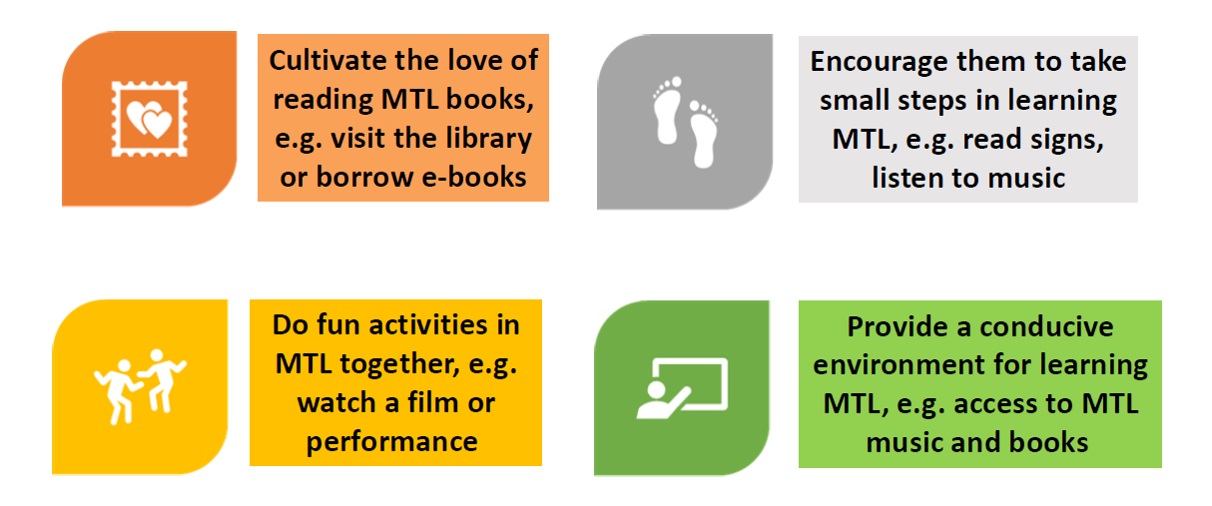
Useful Resources for Parents:
-
MOE website – Various parent kits available
-
Schoolbag - Schoolbag.sg provides parents with education news, school features and tips. You may find tips on supporting your child in learning, which also includes MTL.
-
Parent Gateway – You can also access Parent Resources via PG. This will help you access the resources (e.g. search under Learning --> Language Learning)
-
ETDtogo – You will also find "Tips for Parents" videos in this Youtube channel called "ETDtogo". MOE has produced 3 videos specifically for 2024 New Pri MT Curriculum.


